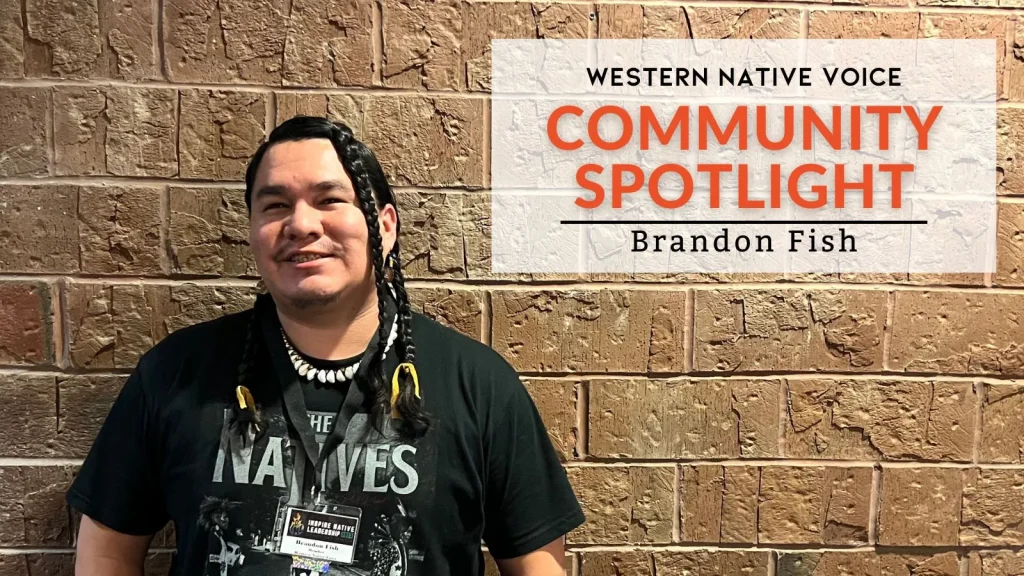
A Young Father Finds Purpose In Family, Culture and Community Action.
Western Native Voice works year-round to inspire Native leadership so our communities flourish. We are excited to share with you Western Native Voice Community Spotlight. It’s designed to highlight grassroots organizing and individuals creating change from across Montana and in Indian Country.
This month, we would like to introduce Brandon Fish of Great Falls. He is Amskapi Pikuni and an enrolled member of the Blackfeet Nation. Brandon has spent many years community organizing and advocating for several causes affecting indigenous people in the U.S. and Canada. He currently works for the International Traditional Games Society.
Tell me a little about yourself.
Okii Nitaaniko Atsimpieta pokaa, I am an enrolled member of the Amskapi Pikuni ( Southern Peigan) one of three tribes in the Siksikkaitsiitapi (Blackfoot Confederacy). I descend from a long line of chiefs, warriors, medicine people, and knowledge keepers ranging from Fish Wolf Robe, Littledog, Many Hides, and Weasel Tail. I have three children; my youngest son, Ohmak kiestu-mim, my daughter Itsiinuaki, and oldest son Iniskim tsakomapii.
My mothers are Philistine Running Crane, Georgianne Fish, Verna Fish, Cleora Little Yellow Kidney and my fathers are Donald Peter Fish, Gabriel Running Crane, Aloysius James Fish, and Merle Yellow Kidney. I was born in Missoula, Montana, and was raised by my mom Philistine in my infant years. From what my mom has told me, we lived as a family group with my mother being the second oldest and my uncle Goobers being the oldest, along with my aunt Roberta Running Wolf, Phillip Many Hides, Jenny Many Hides, Bernard Red Tomahawk and Janet Red Tomahawk. My family was formed like this because they were orphaned at a young age. We moved from Missoula, Montana and lived in Las Vegas and then moved to Portland, Oregon. As a child one of my fondest memories was being carried on the shoulders of my eldest brother, John Red Tomahawk, and walking with my sister Alberta. We would hop a fence and go berry picking in a nearby orchard and munch on those vines for hours on end. It was at the age of six I believe, that I would meet my nina Donnie, who lived at the foothills of the backbone of the world. It was during this time when I started to really become connected and unknowingly more aware .
I was around the age of 9 when I started my journey on the red road in the sun dance lodge and continued to learn the inner workings of different lodges. When I was younger it was about getting through the fasting, but as I got older, it was about the people and where the extra prayers and suffering was needed. From this, I learned how to suffer for the people we love.
Through these lodges, I had the opportunity to know and love the teachers that took me in and showed me what it was to be a human being in this world we live in. My adopted lodge parents Merle Yellow and Cleora Yellow Kidney played a significant roll in the songs, prayer, and guidance I needed to keep going on with this life.
Tell me about your role models.
I would always look to my Nina Donnie for strength and guidance. My Nina saved my life in so many ways but also taught me compassion, humility, and unconditional love. My sister Alberta gave me a lot of inspiration also…she had my back the most and plus we had a similar upbringing. I could talk to her about anything and she encouraged me in my life but also cussed me out when I needed it…when I was being a knot head. I miss that. Most of my siblings are gone now. My older brother hung himself, my younger brother died of a fentanyl overdose, and my sister Alberta died from malpractice. My family has been going through a rough transition with all this loss. They all were instrumental in providing me guidance in my life. Terrance taught me that family is what it is all about and any man is beatable as long as you stand your ground. My brother Fish taught me that the only life that is worth living is one that is free of fear.
“Through these lodges, I had the opportunity to know and love the teachers that took me in and showed me what it was to be a human being in this world we live in.”
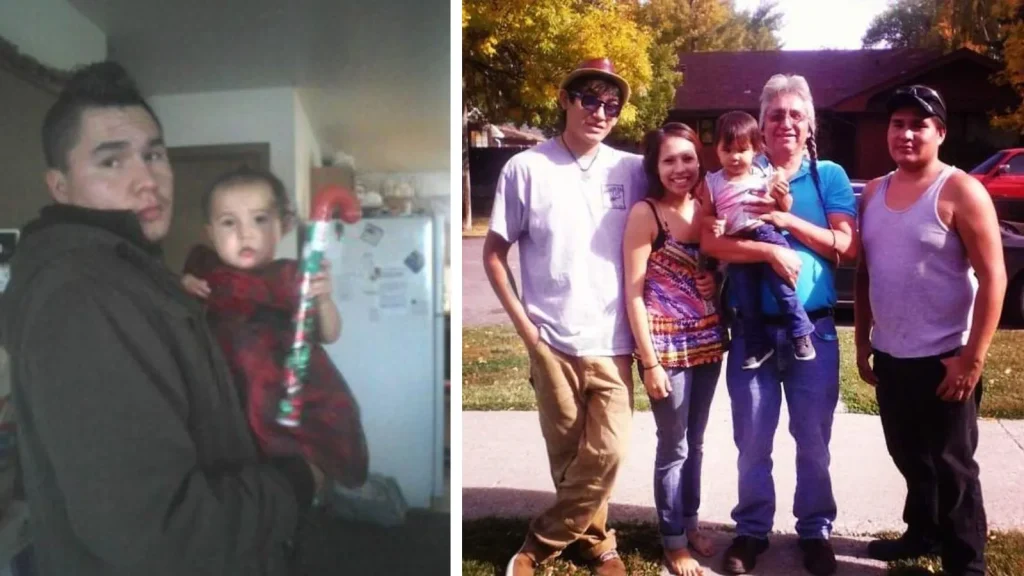
Tell me about your traditional and non-traditional education.
I went to grade school in Great Falls, when I was seven or eight and then jumped back and forth from Browning to Great Falls and then back to Browning. It was just a mess with parenting plans with who wants to have the kids etc. Eventually I ended up running away when I was 17, and I went to Missoula where my girlfriend lived. I sought this as an opportunity to leave the dysfunction in my childhood. I ended up moving in with my sister at the age of 19 in Arizona to get away from all the issues and trying sort out my emotions in my life. I ended up staying there until I was 22 years old.
While in Arizona, I got to experience a different culture with the local Dine’ tribe. I got to see how familiar they were with their language, customs and culture. I felt ashamed because it wasn’t like that back home. Yes, we kept what we could hold on to but it wasn’t as intricate as them. They made fun of me for not knowing my language and even my own people and relatives would shame me.
I went to Blackfeet Community College and received my Associates in Criminal Justice a the age of 27. During this time in my life, I was going through a terrible divorce and my adopted parents were tremendous in helping me transition out of it. Wishy and Verna geared me toward a better way of thinking and helped me get through college. I can’t thank them enough for stepping up when I felt as though there was no one else.
This push and drive helped me get through the University of Montana where I studied Native American Studies and Environmental Studies. I graduated in the Spring of 2020 at the height of the pandemic, and well…nobody showed for that. So I guess it wasn’t too much of a loss. (laughs)
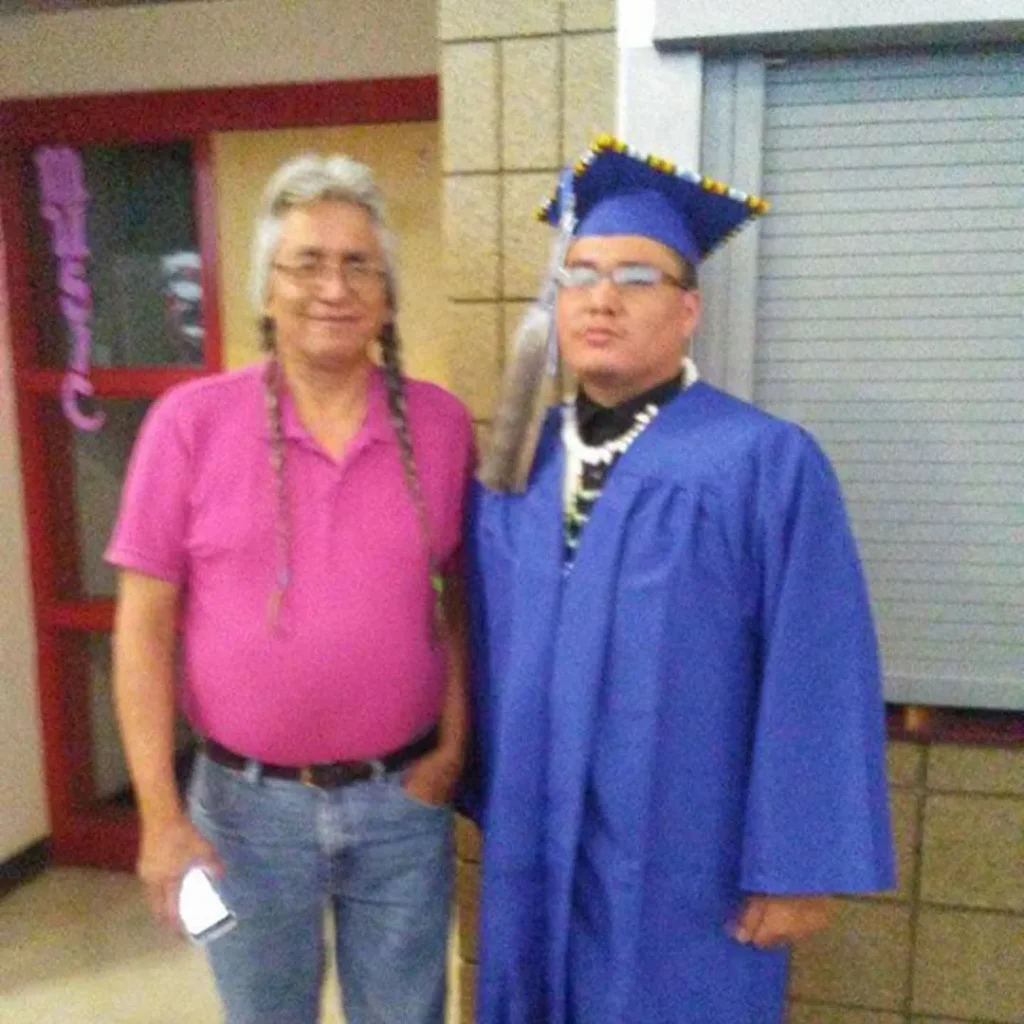
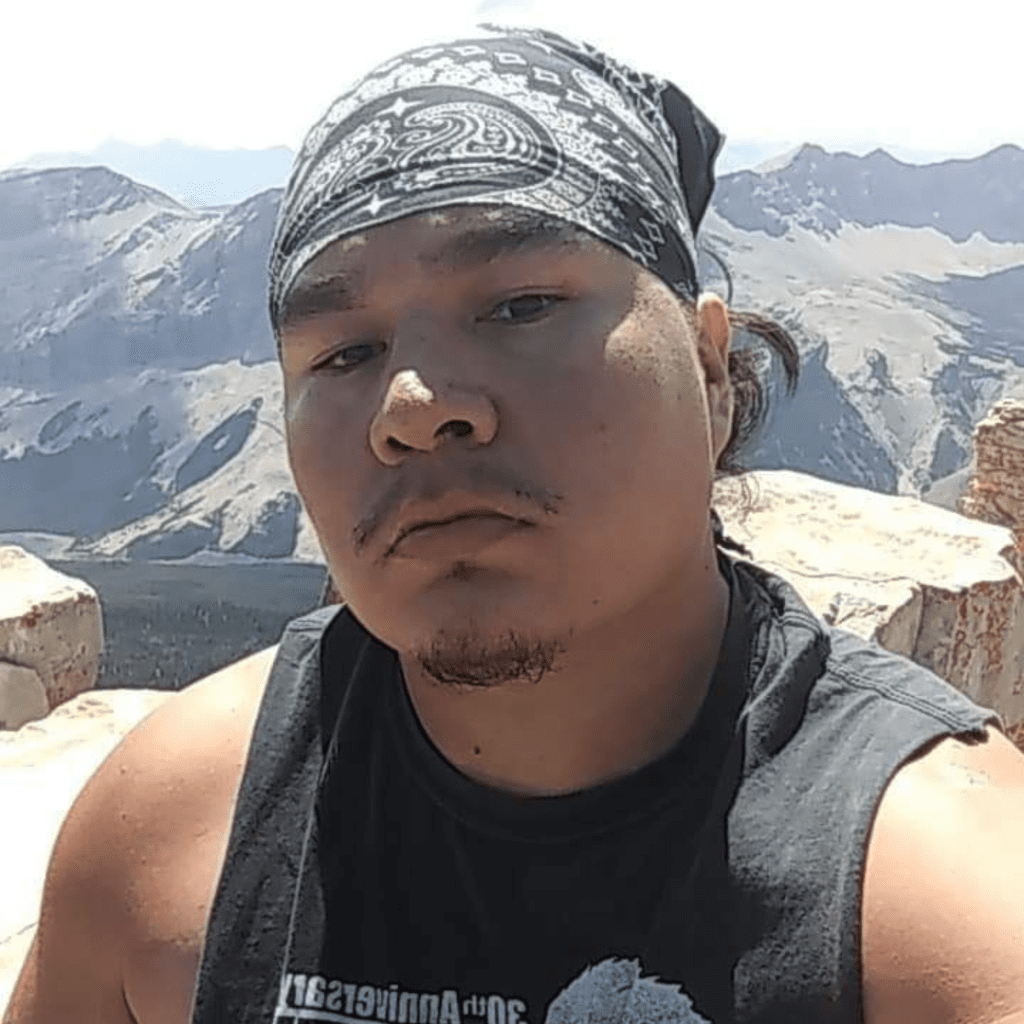
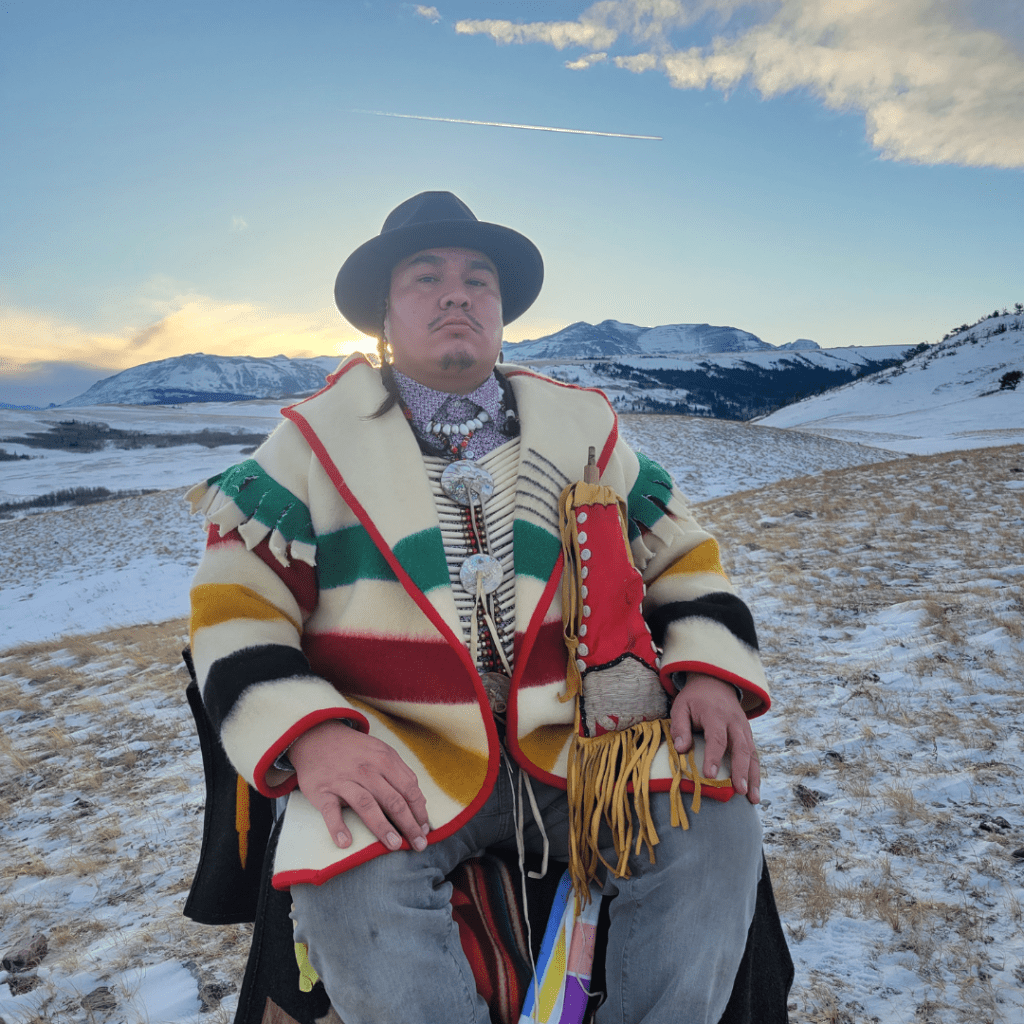
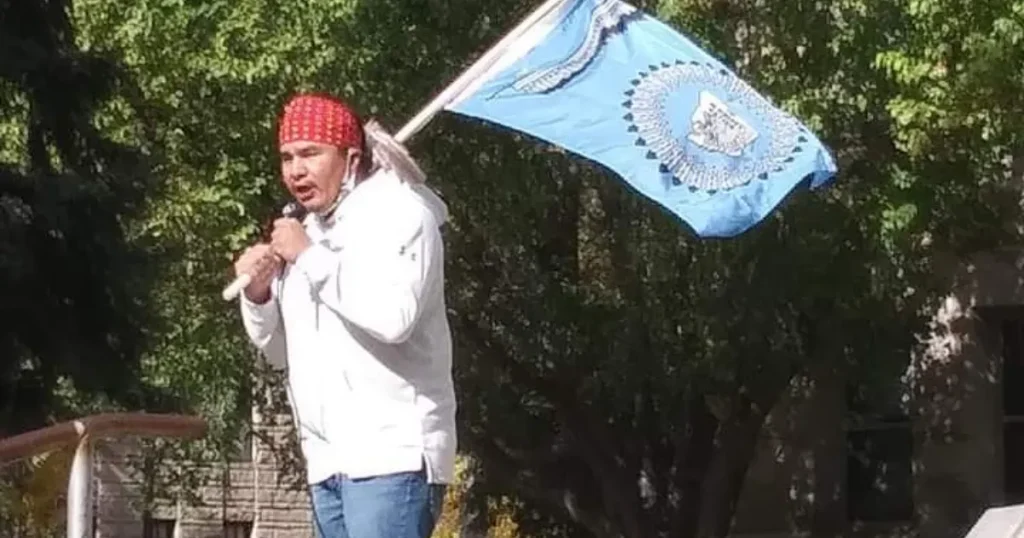
Can you talk about community involvement?
Growing up, I was lead by my nina and we were involved in a camp called “return of the buffalo camp”. My family would go to the mountains every year and camp out and have ceremony. I was involved with that as a kid and would see our family and people from all over the world come to the camp. I would gather wood, be the fire man, or rock man and would eventually join the men in their responsibilities when I was older. A lot of my community work ethic came from that time in those lodges…being a cook, setting up the lodge, learning how to set up teepees and helping without asking. This is how I learned to function in a healthy community. My family tried to instill those values in me.
What inspired me to be more involved, was when I went to the prayer camps at Standing Rock in 2016. I lived in that camp for about a month. Being there was an experience that would be a catalyst of what I did thereafter. Being in that large of a camp and it being a community of prayers, gave us hope. I believed that this is how you heal your people to have courage. I heard the words “we are praying for you”, “we want you to see what you are doing”, “think about your children”, “we love you”. I saw the pipes raised and smoked for all the people that the water gave life to and it gave me a sense of purpose. I look at all those memories and I can see how much one person can move a movement. I experienced deep compassion and love for our people and our ways of knowing and survival, and of how we want to live. We want to live in a time where we don’t have to fight…fight on a daily basis.
I was part of the Montana students for Equality Initiative at the University of Montana. We worked on it for a class and it went a lot farther than I expected it to go. It started when, as students, we went on a tour of a place called the Chippy house in Butte, Montana. It was a place where native women would get raped and murdered. The tour guides, when telling us this history, made it sound like they wanted it, they wanted to be whores. Chippy was a coded wording and an explicit language that was used to cover up the way our people in all tribes were treated during the relocation to ghettos and war camps. The city of Great Falls tried to remove the Chippewa people, because they are a reminder to what they could not kill. So they stole our women and children and killed our men and brought them into those mines. After a generation of rape, murder, and cover up, we are still wondering where our people are that have been missing for years.
I had a bad reaction to that place after hearing the jokes that were said and laughed about, see the women’s clothing stuffed away in the entrance of what they call the chippy house. I heard that the State of Montana had known about this place. I saw the pieces of our past come together…I started hearing women crying, children screaming, pleading for help in that place. I felt like souls of thousands of our people passing through…speaking out for help. I internalized this and know we had to do something. So we held five Truth and Reconciliation meetings with the University of Montana, Silver Bow County, Butte Historical Society, Little Shell Chippewa members, University of Montana Provost, students, administrators, and the presidential cabinet. We asked Little Shell families that knew the stories. Our stories are very, very, important. If they are going to talk about our history then they need to talk to us about our perspective. I am still very salty about this whole experience but it also taught me a valuable lesson. Keep persevering and stand your ground.
I was also an officer on Voices for Change, Rez Edition. We saw how George Floyd was murdered in front of the country. Some local kids and others staged a protest on Juneteenth. We marched and chanted and showed our signs and talked about what this means to us and what we want to do in the future. We invited the college, the BIA, and different candidates and asked them to come out and speak and listen to what the kids had to say.
We also held a community feed and voiced our opinions on what we wanted to see with our tribal council. The Voices For Change also protested the strip mining of Napi’s playground. This area is located in Crows Nest Pass. The Nitsitapi utilized these areas for thousands of years with fasting and cultural sites.
Along with another group from Canada, the Nitsitapi Water Protectors, we conveyed our message to support our northern brothers and sisters to protect our mountains and waterways.
In Great Falls, we developed the “Remember Us, We Are Still Here” movement after we saw that 250 children were re-discovered at Kamloops Alberta residential boarding schools. We started this event with a group of three people. At one point we had over 40 people at one meeting, which then tapered to a core group of 10. We marched and expressed ourselves with over 200 people showing up. We had veterans, Heart Butte high school, Krazy Dog Society, Little Shell tribal members, and a community of support pushing back the agenda and opening up meaningful conversations for our future.
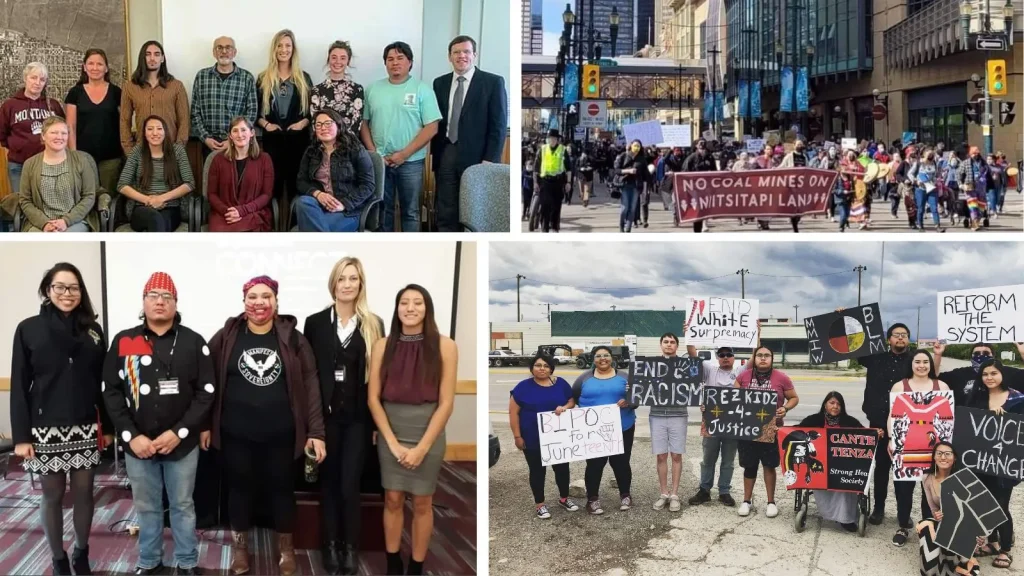
Would you consider running for office?
Yes, it has crossed my mind. Many of the policies that are in place don’t benefit Native people, such as the Major Crimes Act and Indian Civil Rights Act. However, I hold myself back from running because I worry about who will be taking care of my children if I am gone all the time. I have responsibilities both culturally for my community and for my family. Who would take my place in my absence to love my kids and be there unconditionally for the people?
What are you doing now?
I currently work for the International Traditional Games Society (ITGS). Since June 2022, ITGS has advocated and developed an event called the Gathering of Families 2023. A unification of many grassroots organizations have been called upon and have developed partnerships, initiating a movement toward a healthy, and organized way to celebrate indigenous people through the Gathering of Families 2023.
On October 8th – 14th 2023, ITGS will celebrate with a powwow, art shows and galleries, have events such as indigenous education, film, entertainment, and a traditional tournament style of gaming.The grand finale will be an indigenous-themed parade in downtown Great Falls.
Historically, traditional games have always been a vital part of our teachings and in our knowledge. ITGS is offering a healthy solution to our youth and anyone who wants to learn our ways of understanding. Meaning, we evolve back into our ancestors with the changing of times…the ways in which we approach youth development matters because of how much this world has bred an environment without identity. We need to be that change that is needed in our world by coming together to celebrate cultural exchange and to offer healthy solutions to this identity crisis.
In the first year, we hope to lay the foundation to be able to host the World International traditional Games Olympics. That will co-align with the World Nomad Games in 2026. ITGS has formed partnerships with the Lewis and Clark Interpretive Center, First Peoples Buffalo Jump, Montana United Indian Association, the Great Falls Public Schools Indian Education Department, Alliance for Youth, Montana Children’s Museum, Charles M. Russell Museum, the Square Art Museum, Montana Department of Commerce, Montana Department of Tourism, State Tribal Economic Development Commission, Visit Great falls, Helena Indian Alliance, Little Shell Cultural Director, Western Native Voice, Seattle based organizations, Mopistaan Four Directions and the Washington United Indian of all Tribes Foundation.
We are still seeking sponsorships for the Gathering of Families event. Support will be needed by all tribal nations for this to be a successful event. You can contact me at Itgslead@outlook.com for more information.
What is one change you would want to see in your community within the next five years?
I would like to see the city of Great Falls have equal representation and rights for indigenous people. I would like to see the school district re-evaluate how its treating indigenous people. I would like to see our city officials, county commissioners, and state officials educate themselves on treaty rights and state and federal responsibilities when it comes to education and the lateral violence that is being used against our children.

